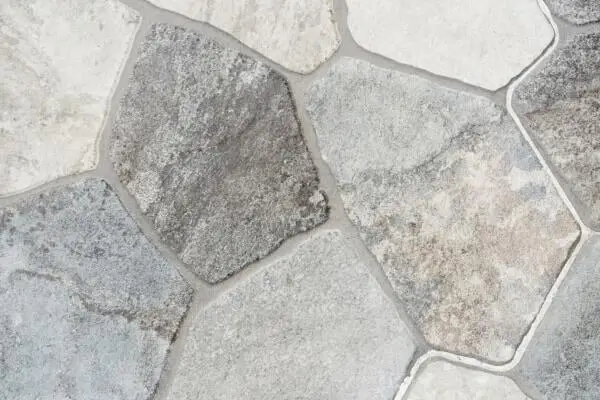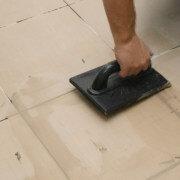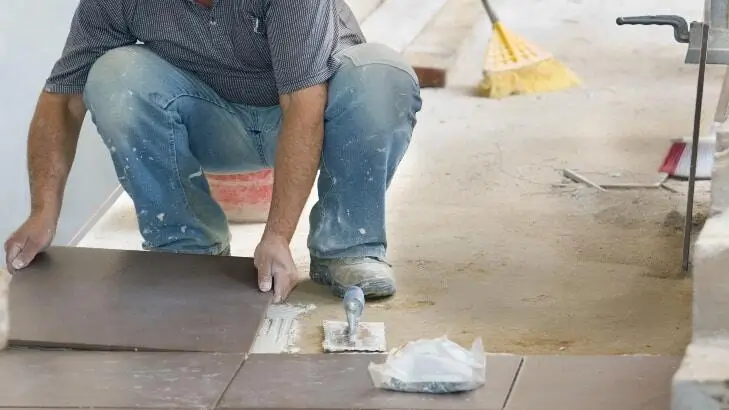Different types of grout for natural stone

How to choose the right type of grout for natural stone?
Natural stone tiling projects consist of several steps including laying the tiles, sealing them and grouting the gaps. In this article we take a closer look at the latter, as there are different types of grout for natural stone, and the choice is not always obvious. The purpose of grout is to help keep the tiles or stones in their place, create a watertight seam which prevents liquids from seeping to the adhesive layer and make up a supportive network throughout the tiled area.
When working with natural stone, the choice of grout should be based on several factors including the stone type, color of the stone and the gap width. Especially when tiling with naturally shaped natural stone, the gaps may be rather large, which requires a special grout.
Cementitious grout - sanded and unsanded

Cementitious grout is the oldest and most common grout for natural stone flooring. It is also suitable for grouting vertical tiling. The main ingredient of these types of grout is Portland cement which is accompanied by filler particles of different sizes, water retentive additives and color pigments. Sometimes adding a latex polymer can improve waterproof properties.
Cementitious grout is usually a powder which requires mixing with water prior to application. The water retentive additive prolongs the curing time of the grout allowing for longer processing time. The downside of cementitious grout is that the seams need frequent maintenance, as the structure remains somewhat porous. Typically the seams require sealing once in a year or two.
2 types of cementitious grout for natural stone
Cementitious grout exists in two types: sanded and unsanded. The choice between the two is often based on the width of the gaps that require filling and sealing.
- Unsanded
Unsanded cementitious grout contains very fine mineral powder which makes the texture smooth. These are suitable for narrow seams as they are prone to shrinkage. The wider the seam, the more grout is needed and the more it shrinks causing the grout to crack easily. - Sanded
Sanded grout is ideal for large seams between natural stones. These types of grout for natural stone contain sand which makes the bonds stronger and prevents cracking. If sanded grout is applied to soft or glossy stone, the sand may scratch the surface. As a precaution, the compatibility of the grout and tile should always be tested on a sample.
Note that both of the types of cementitious grout may stain porous natural stone. Therefore, sealing the tiles, or applying grout release, is recommended 24 hours before grouting. The sealer should not be applied too soon after natural stone adhesive.
Epoxy grout - the best grout for natural stone tiles
Epoxy grout is strong, form impermeable seams and is resistant to staining. It could well be said that this is the best grout for natural stone. However, all the benefits have a price tag: epoxy grout is the most expensive type of grout for natural stone. It may, nonetheless, be worth the investment, as the seams do not require sealing - ever.
Epoxy grout is typically a two or three component system which consists of epoxy resin, silica fillers, hardener and color pigments. Mixing the resin and the hardener prior to application starts the chemical reaction resulting in curing. Epoxy grout has a rather short processing time making it slightly more difficult to apply than cementitious grouts.
Tip: to extend the processing time, divide the mixed grout to two containers: one to use right away and the other to keep in the freezer. The low temperature slows down the chemical reaction.
Cementitious epoxy grout
When Portland cement is added to epoxy grout, the result is a system with similar properties to those of cementitious grout. However, the epoxy improves the waterproof properties, makes the seams harder and stronger and reduces, but does not eliminate, the need for maintenance. As these seams are comparable to those created with cementitious grout, they must be sealed after the grout is applied.
Pre-mixed grout for commercial use
If the properties of epoxy grout are what your project requires, but the application process does not seem appealing, you might consider a pre-mixed system which is as strong as epoxy. Traditionally, pre-mixed grout is not the most ideal system for commercial applications which require certain certification and durability. However, the most innovative, even revolutionary systems are as strong as 2K epoxy grout and comply with standards such as ANSI 118.3, the American National Standard specifications for chemical resistant, water cleanable tile setting and grouting epoxy. In addition to compliance with ANSI 118.3, these pre-mixed grouting systems come with other benefits including:
- Increased efficiency: as these systems do not need mixing, and they are fast and easy to apply thanks to their creamy consistency, efficiency can be significantly increased.
- Versatility: the pre-mixed grout is suitable for interior and exterior use. It also works well with different tiles and surfaces. Therefore, it offers a wide range of possibilities as a grout for natural stone tiles.
- Strength: some pre-mixed grout systems are just as strong as traditional epoxy grout even though they do not contain epoxy resin.
- Chemical resistance: one of the main problems usually experienced with pre-mixed systems is poor chemical resistance. The new, revolutionary formulation, nonetheless, is resistant to a broad range of chemicals. Contact us for more information!
- Low VOC: pre-mixed grout for tiles exists as environmentally friendly systems which have close to zero VOC value. The systems free of epoxy resin have a lower risk of allergic reaction.
More information on different types of grout for natural stone
Do you need more information on the different types of grout for natural stone? Are you looking for a solution for a specific project? Or would you like the challenge your current supplier? Contact us and let our experts find you the best possible grout for natural stone in your project.
Discover more solutions for building & construction
What solution are you looking for?
We are specialized in the building and construction. Need the best products or advice? Then please leave your details and we will get in touch.





